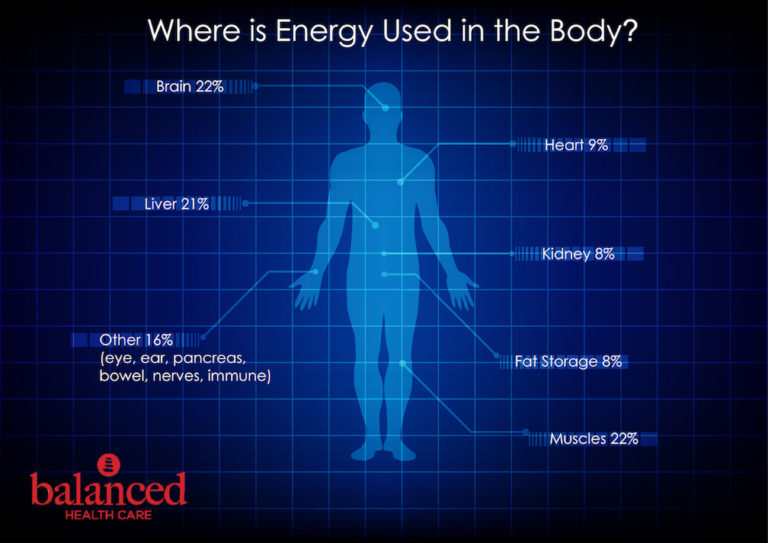
FEATURE — For some of us, there never seems to be enough time in a day to get everything done. What makes it even harder is when the afternoon doldrums hit with the force of a brick wall.

You know the feeling – your brain starts to feel foggy and sluggish, it takes longer to do the simple tasks, and you have low energy.
Even if we have a good lunch with the needed protein and nutrients, our body is ready for a nap. What causes this? And most importantly, what can we do to change that?
Let’s look at the seven main areas that need to be investigated to improve low energy or chronic fatigue and what can be done to turn this problem around.
1- That feeling in your gut
This is the basic principle of our bodies using food to create energy. Problems with the balance of the gut or its functions decrease the amount of energy we have, despite how much or how well we eat. We have patients come in eating the best diets and still have serious gut issues.
Treatment: Getting some in-depth blood and stool testing can be very helpful here. Do you think you might have “leaky gut”? Take a closer look at Zonulin.
2- Mitochondria: Little workers in the food industry
These are the little “factories” in each of our cells. Their job is to make chemical energy that our bodies use to function by using carbs, fats and proteins that we ingest. There are many different things that can slow down this work in the “factories.”
Studying mitochondrial DNA (which is different than our human DNA) and its function has been a hot topic in the research world for the last five to 10 years. Unfortunately, this means that the mainstream doctors don’t know too much about it, and therefore don’t test for or treat it.
Treatment: Eat your vegetables, find a functional medicine provider and enjoy the ride!
3- Regulating the thyroid
This is the main hormone that regulates our metabolism, the rate at which we produce energy from our food. So this thyroid hormone tells our body systems how active to be. These thyroid levels affect every part of the body (i.e., hair loss, brain function, immune system, the gut and even cold toes). Really understanding the thyroid system isn’t hard but very important.
Treatment: Before trusting your doctor with your thyroid labs, ask him or her to quickly draw out the thyroid pathway. This should be a very easy thing to do and should take less than 90 seconds. The next test to see if you are getting good thyroid care will be to look at the number of thyroid markers tested. Nine or above and you know you are in good hands.
4- Activate the adrenals

The adrenal glands produce hormones that make our bodies alert and active. The most common hormone is cortisol, or your alarm clock to wake-up and go. There are eight in all. If all of these are in balance then our eyes awake at a decent hour ready to face the day, we go about our day without fatigue, and we can fall easily into a deep sleep when our head hits the pillow.
The adrenal glands can cover-up other problems to some extent and are almost always involved when other problems are present. The adrenals themselves can also fatigue over time if abused as their cellular resources are used up. Fatigue is covered up by sugar, caffeine and other stimulants. These are often cravings that people have but don’t understand why.
Treatment: This needs to be personalized to each individual’s unique circumstances and their stage of adrenal fatigue. Saliva or urine is the best way to test this. Generally, magnesium and natural sources of vitamin C are a good place to start the recovery and improve your low energy.
5- Balancing sex hormones
This is the third part of the hormone triangle formed with thyroid and the adrenals. A close balance needs to be maintained between thyroid hormones, adrenal hormones and the sex hormones. Have you ever noticed that menopause symptoms sound a lot like an adrenaline rush? Or how some women never seem to recover after childbirth? When this balance is off, a lack of energy is sure to follow.
Treatment: Hormones can be tricky. They are constantly changing and even a fraction off here or there can cause problems. For that reason, it is often better to supplement things that become progesterone, estrogen or testosterone and let the body regulate the final hormone amount. That way, the body can better maintain hormone balance and overall function easier than an exact hormone prescription.
6- The power of immunity
The immune system is very “energy” expensive to run. That’s why someone with the flu will only have enough energy to make it to the bathroom and back (hopefully) and little else. Most of that person’s energy is being used to fight a war within. Most of the wars we fight are small and unnoticed. Unfortunately, an unrecognized infection or autoimmunity can consistently drain a person’s energy without them knowing why.
Ironically, the most common type of autoimmunity involves the thyroid, which goes undiagnosed because the right labs were never ordered. On the other side of immune function we have cancer. We all get cancer everyday, but our immune system finds it and destroys it.
Treatment: If there is an infection, find it and fight it. If there is an environment of autoimmunity or cancer, change the environment. The goal here is to shut off that disease process as much as possible and keep it off.
7- Anemia deficiencies
Any kind of anemia that disrupts oxygen delivery to the body will result in low energy. This will particularly be seen in tissues that use a lot of oxygen like the brain, liver, heart and muscles. There are many different types of anemia, but the two most common are a deficiency in B vitamins, or a deficiency in iron. One of the most common blood tests will show this, especially if the physician is paying attention and not just looking for big abnormalities.
For example, most doctors will miss B vitamin problems unless it is really bad. Therefore, too many people walk around with larger-than-ideal red blood cells due to a lack of vitamin B-12 and experience a mild-moderate pernicious anemia.
Treatment: Find a functional medicine provider who will look at the subtle changes in your iron and B vitamins. You may have a deficiency present that is causing low energy but is not bad enough to be officially diagnosed.
Written by DR. BRENT NOORDA, Balanced Health Care.
• S P O N S O R E D C O N T E N T •
About Balanced Health Care
Balanced Health Care professionals work together as a multidisciplinary team to get to the root cause of chronic conditions. They dig deep to find the answers and approach your health with a unique perspective. The teams works to get your health balanced! They use the latest technology in their St. George chiropractor office to help you to live healthy and happy.
Balanced Health Care is dedicated to providing the absolute best health care to their community. They have a team of providers trained and ready to change the way you think about health care.
Resources
- Balanced Health Care, 368 E. Riverside Drive, No. 8, St. George| Telephone: 435-688-2292 | Website
Email: [email protected]
Twitter: @STGnews